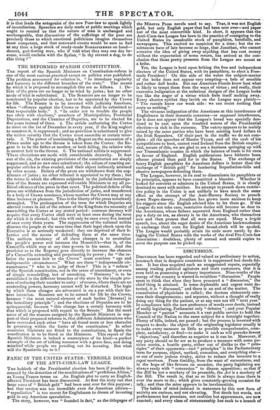THE REFORMED SPANISH CONSTITUTION.
THE report of the Spanish Ministers on Constitution-reform is one of the most curious practical essays on politics ever published. The problem announced for solution is, " to introduce regularity and harmony in the different branches of the state." The means by which it is proposed to accomplish this are as follows. 1. De- licts of the press are no longer to be tried by juries; but no other mode of trial is substituted. 2. The Senators are no longer to be nominated by popular election, but to be appointed by the Crown for life. The Senate is to be invested with judiciary functions, when "offences against the Crown or State shall be submitted to that respectable body." 3. "In order not to trouble the people too often with elections," members of Municipalities, Provincial Deputations, and the Chamber of Deputies, are to be elected for five years instead of three. 4. The article authorizing the Cortes to meet on the 1st of December in every year, if the King neglect to summon it, is suppressed ; and no provision is substituted to give the nation security that the Cortes must assemble at certain inter- vals. 5. The power of nominating a Regent on the succession of a Prince under age to the throne is taken from the Cortes : the Re- gent is to be the father or mother, or both failing, the relative who is nearest heir to the throne. 6. The national militia is suppressed. These alterations are made with considerable dexterity. In four out of the six, the existing provisions of the constitution are simply suppressed, and no new ones substituted ; the odium of enacting un- popular articles is thus evaded, and their object indirectly attained by other means. Delicts of the press are withdrawn from the cog- nizance of juries ; no other tribunal is appointed to try them ; but the terms in which the offences subjected to the judicial investiga- tion of the Senate are expressed will enable Ministers to try all po- litical offences of the press in that court. The political delicts of the press are withdrawn from the jurisdiction of juries, and transferred to a body of Crown nominees, whose number the Crown may at any time increase at pleasure. Thus is the liberty of the press noiselessly strangled. The prolongation of the term for which Deputies are elected comes in aid of the release of the King from the necessity of assembling the Cortes at any stated period : common decency will require that every Cortes shall meet at least once during the term for which it is elected ; but this will only be once every five instead of once every three years. The suppression of the national militia disarms the people at the same time that their legal check upon the Executive is so seriously weakened : they are deprived of their li- berties and the means of defending them at the same time. The uniform tendency of all these changes is to neutralize the people's power and increase the Monarch's—that is, of the Camarilla which may at any time govern in his name. And the provision as to the Regency goes directly to increase the chances of a Camarilla extending and perpetuating its power ; for "the re- lative the nearest heir to the Crown" must combine "age and indispensable circumstances." What are these "indispensable cir- cumstances " ? who is to judge of them ? This is a " reform " of the Spanish constitution, not in the sense of amendment, or even of simple remodelling, but of unmaking. " Harmony" is to be established in the different branches of the state by the simple pro- cess of reducing their number to unity : of course, where there are no contending powers, harmony cannot well be disturbed. The logic by which these changes are advocated is on a par with their ho- nest intention. Senators are to be named for life by the Crown, because "the most natural element of such bodies [Senates] is the hereditary principle" ; and the elections of Deputies are to be quinquennial, because "this change has a certain harmony with that which is proposed with regard to the Senate." But the most naïve of all the reasons assigned by the Spanish Ministers in sup- port of their proposed reforms is, that different Administrations who have succeeded each other " have all found more or less obstacles in governing within the limits of the constitution." In other countries Ministers are fitted to the constitutions, in Spain the constitution is to be fitted to the Ministers. This report of the Spanish Ministers is indeed a masterpiece of its kind—a perfect example of the art of talking nonsense with a grave face, and doing mischief while people are puzzling out its meaning. But what will the Spaniards say to it ?


























 Previous page
Previous page